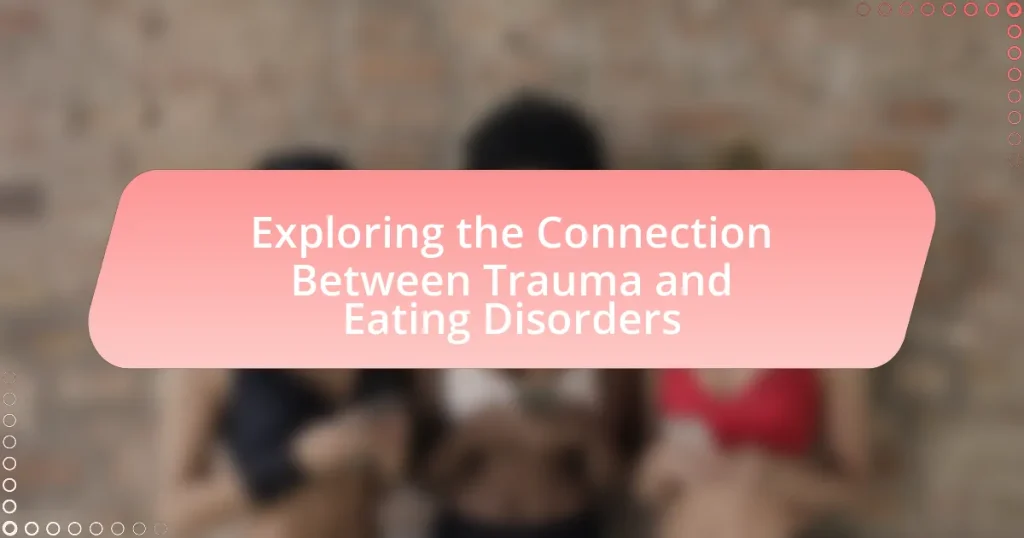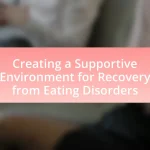The article explores the significant connection between trauma and eating disorders, highlighting how traumatic experiences, such as abuse and neglect, can lead to disordered eating behaviors as coping mechanisms for emotional pain. It discusses the prevalence of trauma among individuals with eating disorders, the psychological mechanisms involved, and the types of trauma commonly linked to these conditions. Furthermore, the article emphasizes the importance of understanding this connection for effective treatment and recovery, advocating for trauma-informed care and integrated therapeutic approaches to address both trauma and eating disorders simultaneously. It also outlines practical steps individuals can take to seek help and improve their recovery outcomes.
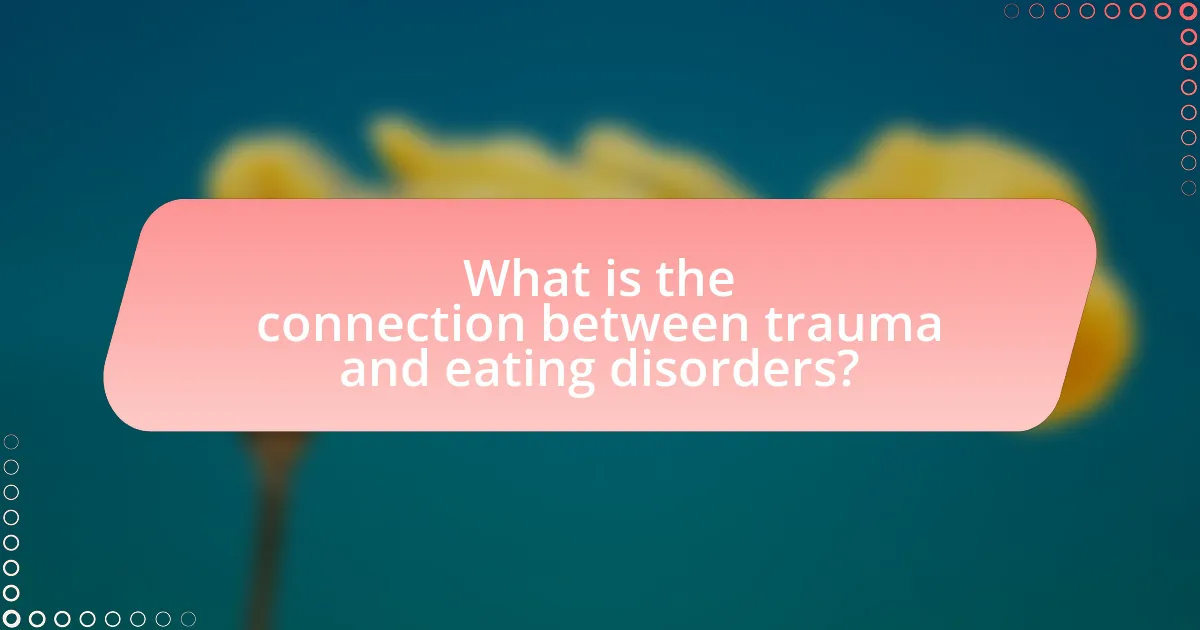
What is the connection between trauma and eating disorders?
Trauma is significantly linked to the development of eating disorders, as individuals often use disordered eating behaviors as coping mechanisms to manage emotional pain. Research indicates that traumatic experiences, such as abuse or neglect, can lead to dysregulated emotions and a distorted body image, which are common precursors to eating disorders. A study published in the journal “Eating Disorders” found that individuals with a history of trauma are at a higher risk for developing conditions like anorexia nervosa and bulimia nervosa, highlighting the psychological impact of trauma on eating behaviors.
How do trauma and eating disorders relate to each other?
Trauma and eating disorders are closely related, as traumatic experiences can significantly increase the risk of developing eating disorders. Research indicates that individuals who have experienced trauma, such as abuse or neglect, often use disordered eating behaviors as a coping mechanism to manage emotional pain and distress. A study published in the Journal of Trauma & Dissociation found that 30-50% of individuals with eating disorders report a history of trauma, highlighting the prevalence of this connection. Furthermore, trauma can disrupt an individual’s relationship with food and body image, leading to maladaptive behaviors such as binge eating, purging, or restrictive eating.
What types of trauma are commonly linked to eating disorders?
Types of trauma commonly linked to eating disorders include childhood abuse, neglect, and bullying. Research indicates that individuals who experience physical, emotional, or sexual abuse during childhood are at a higher risk of developing eating disorders later in life. A study published in the Journal of Eating Disorders found that 40% of individuals with anorexia nervosa reported a history of trauma, particularly abuse. Additionally, experiences of bullying, especially related to body image, have been shown to contribute significantly to the onset of disorders such as bulimia and binge eating disorder. These traumatic experiences can lead to maladaptive coping mechanisms, including disordered eating behaviors.
How does the experience of trauma influence eating behaviors?
The experience of trauma significantly influences eating behaviors by leading to maladaptive coping mechanisms, such as emotional eating or restrictive eating patterns. Individuals who have experienced trauma often use food as a means to cope with emotional distress, resulting in binge eating or overeating as a way to numb feelings. Conversely, some may develop restrictive eating behaviors as a form of control in response to feelings of helplessness associated with trauma. Research indicates that approximately 30% of individuals with eating disorders report a history of trauma, highlighting the strong correlation between traumatic experiences and disordered eating patterns.
Why is understanding this connection important?
Understanding the connection between trauma and eating disorders is crucial because it informs effective treatment strategies. Research indicates that individuals with a history of trauma are at a significantly higher risk of developing eating disorders, with studies showing that up to 50% of those with eating disorders report experiencing trauma. Recognizing this link allows mental health professionals to tailor interventions that address both trauma and disordered eating behaviors, ultimately improving recovery outcomes.
What are the implications for treatment and recovery?
The implications for treatment and recovery in the context of trauma and eating disorders are significant, as addressing underlying trauma is crucial for effective intervention. Research indicates that individuals with eating disorders often have a history of trauma, which can exacerbate symptoms and hinder recovery. For instance, a study published in the Journal of Trauma & Dissociation found that trauma-informed care approaches improve treatment outcomes for patients with eating disorders by addressing the psychological aspects of trauma. This highlights the necessity of integrating trauma-focused therapies, such as Cognitive Behavioral Therapy and Eye Movement Desensitization and Reprocessing, into treatment plans to facilitate recovery. By acknowledging and treating the trauma, healthcare providers can enhance the likelihood of sustained recovery and improve overall mental health outcomes for individuals suffering from eating disorders.
How can awareness of this connection improve support systems?
Awareness of the connection between trauma and eating disorders can significantly enhance support systems by fostering a more empathetic and informed approach to treatment. Understanding that trauma often underlies eating disorders allows healthcare providers to tailor interventions that address both psychological and physical aspects of the disorders. For instance, research indicates that individuals with a history of trauma are at a higher risk for developing eating disorders, as evidenced by a study published in the Journal of Trauma & Dissociation, which found that 70% of individuals with eating disorders reported experiencing trauma. By integrating trauma-informed care into support systems, practitioners can create safe environments that promote healing and recovery, ultimately leading to better outcomes for individuals affected by these conditions.
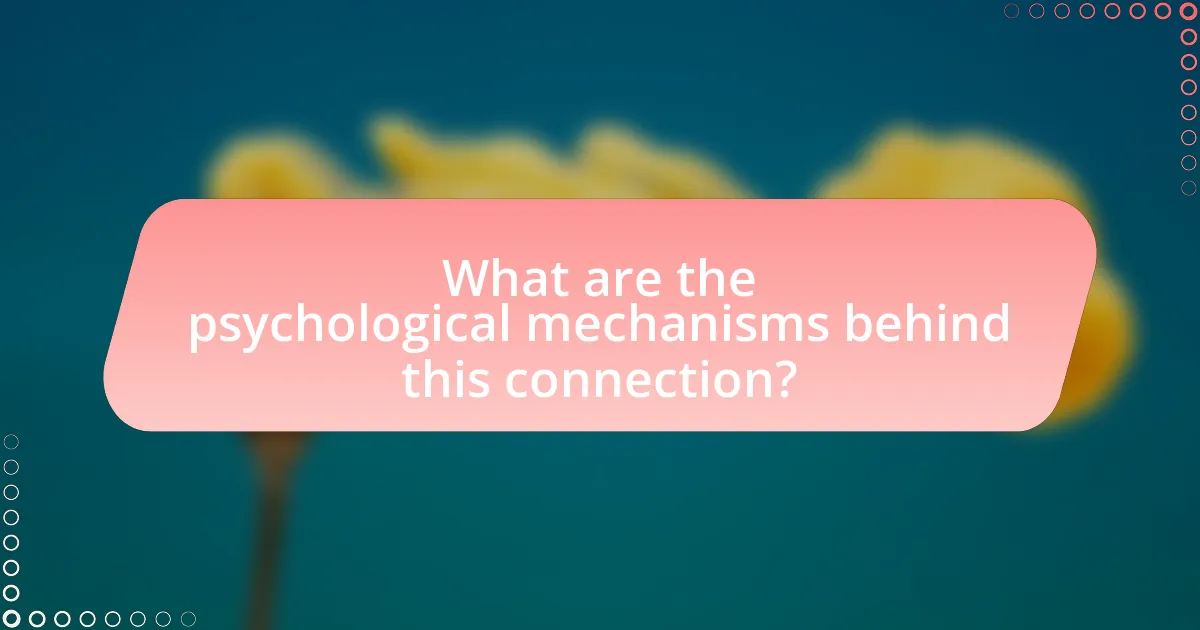
What are the psychological mechanisms behind this connection?
The psychological mechanisms behind the connection between trauma and eating disorders include emotional regulation, cognitive distortions, and the impact of stress responses. Individuals who experience trauma often struggle with managing their emotions, leading them to use disordered eating behaviors as a coping mechanism to gain a sense of control or to numb emotional pain. Cognitive distortions, such as negative self-image and perfectionism, can also arise from traumatic experiences, further contributing to the development of eating disorders. Research indicates that approximately 30% of individuals with eating disorders have a history of trauma, highlighting the significant correlation between these psychological factors and the manifestation of disordered eating behaviors.
How does trauma affect mental health and body image?
Trauma significantly impacts mental health and body image by leading to conditions such as anxiety, depression, and distorted self-perception. Individuals who experience trauma often develop negative beliefs about themselves, which can manifest as low self-esteem and body dissatisfaction. Research indicates that approximately 70% of individuals with eating disorders report a history of trauma, highlighting the strong correlation between traumatic experiences and disordered eating behaviors. Furthermore, trauma can trigger maladaptive coping mechanisms, such as restrictive eating or bingeing, as individuals attempt to regain control over their bodies and emotions. This cycle reinforces negative body image and exacerbates mental health issues, creating a complex interplay between trauma, mental health, and body image.
What role does self-esteem play in the development of eating disorders?
Self-esteem significantly influences the development of eating disorders, as low self-esteem is often linked to negative body image and unhealthy eating behaviors. Individuals with low self-esteem may engage in disordered eating as a coping mechanism to manage feelings of inadequacy or to seek validation through appearance. Research indicates that approximately 80% of individuals with eating disorders report low self-esteem, highlighting its critical role in the onset and maintenance of these conditions. Furthermore, studies show that interventions aimed at improving self-esteem can lead to reductions in disordered eating behaviors, reinforcing the connection between self-esteem and eating disorders.
How can coping mechanisms lead to disordered eating?
Coping mechanisms can lead to disordered eating by creating maladaptive behaviors that individuals use to manage emotional distress. When people experience trauma or significant stress, they may turn to food as a source of comfort or control, resulting in patterns such as binge eating or restrictive dieting. Research indicates that individuals with a history of trauma often develop these coping strategies as a way to numb emotional pain or regain a sense of agency over their bodies, which can ultimately contribute to the development of eating disorders. For instance, a study published in the journal “Eating Behaviors” found that individuals who utilize emotional eating as a coping strategy are at a higher risk for developing disordered eating patterns.
What are the common emotional responses to trauma that may trigger eating disorders?
Common emotional responses to trauma that may trigger eating disorders include anxiety, depression, and feelings of shame or guilt. Anxiety often manifests as a need for control, leading individuals to engage in restrictive eating or bingeing behaviors as a coping mechanism. Depression can result in a loss of interest in food or emotional eating as a way to numb feelings. Feelings of shame or guilt related to the trauma can drive individuals to use food as a means of self-punishment or as a way to cope with overwhelming emotions. Research indicates that individuals with a history of trauma are significantly more likely to develop eating disorders, highlighting the strong link between emotional responses to trauma and disordered eating behaviors.
How do feelings of shame and guilt relate to eating behaviors?
Feelings of shame and guilt significantly influence eating behaviors by contributing to disordered eating patterns. Individuals experiencing shame may engage in emotional eating as a coping mechanism to alleviate negative feelings, while guilt can lead to restrictive eating or compensatory behaviors, such as purging. Research indicates that shame is linked to binge eating, as individuals may use food to numb emotional pain, while guilt often results in a cycle of overeating followed by restrictive dieting, reinforcing unhealthy relationships with food. A study published in the journal “Appetite” by researchers at the University of California found that higher levels of shame and guilt correlate with increased binge eating episodes, highlighting the psychological impact of these emotions on eating behaviors.
What is the impact of anxiety and depression on eating disorders?
Anxiety and depression significantly exacerbate the severity and prevalence of eating disorders. Individuals with anxiety often engage in disordered eating behaviors as a coping mechanism to manage their emotional distress, while depression can lead to changes in appetite and weight, further complicating eating patterns. Research indicates that approximately 50% of individuals with eating disorders also experience anxiety disorders, and around 30% have a history of depression, highlighting a strong comorbidity between these mental health issues and eating disorders. This interplay can create a vicious cycle, where the symptoms of anxiety and depression worsen the eating disorder, and the eating disorder, in turn, intensifies feelings of anxiety and depression.
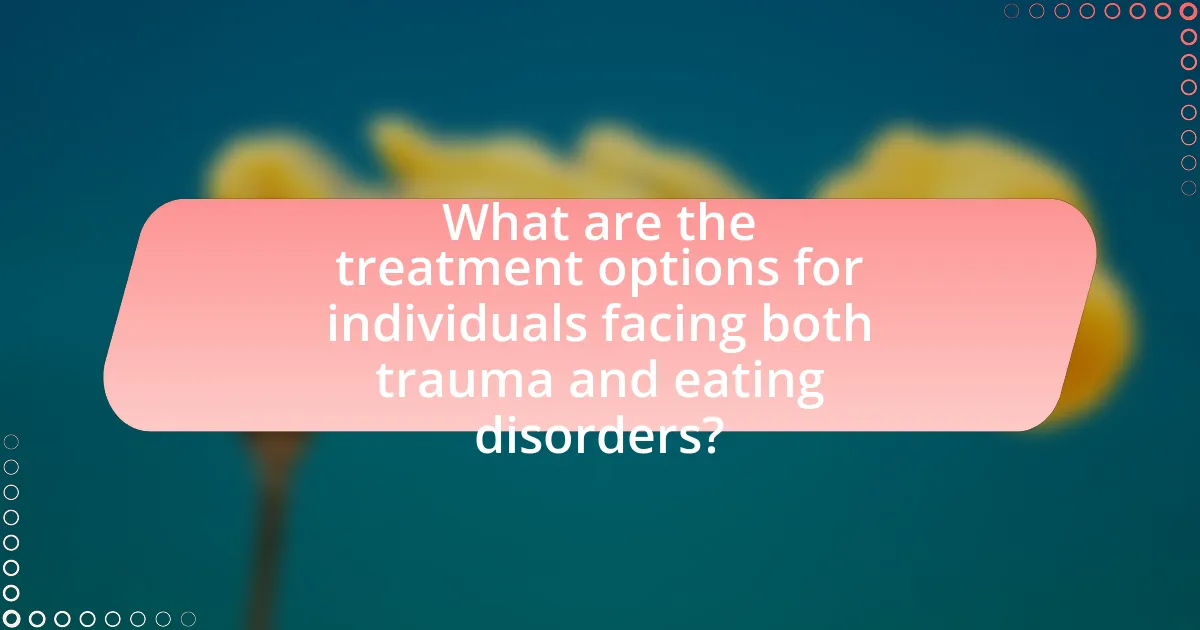
What are the treatment options for individuals facing both trauma and eating disorders?
Treatment options for individuals facing both trauma and eating disorders include integrated therapies that address both issues simultaneously. Evidence-based approaches such as Cognitive Behavioral Therapy (CBT) and Dialectical Behavior Therapy (DBT) have shown effectiveness in treating co-occurring trauma and eating disorders by helping individuals develop coping strategies and improve emotional regulation. Additionally, trauma-focused therapies, such as Eye Movement Desensitization and Reprocessing (EMDR), can specifically target traumatic experiences while also addressing disordered eating behaviors. Research indicates that a comprehensive treatment plan that includes nutritional counseling, psychotherapy, and support groups can significantly improve outcomes for individuals dealing with these intertwined challenges.
How can trauma-informed care be integrated into eating disorder treatment?
Trauma-informed care can be integrated into eating disorder treatment by prioritizing safety, trustworthiness, and empowerment in the therapeutic environment. This approach involves training healthcare providers to recognize the signs of trauma and understand its impact on individuals with eating disorders, thereby fostering a supportive atmosphere that encourages open communication and collaboration. Research indicates that approximately 70% of individuals with eating disorders have experienced some form of trauma, highlighting the necessity of this integration. By implementing trauma-informed practices, such as establishing clear boundaries, promoting patient autonomy, and incorporating trauma-specific interventions, treatment can be more effective and responsive to the unique needs of those affected.
What therapeutic approaches are most effective for dual diagnosis?
Cognitive Behavioral Therapy (CBT) and Dialectical Behavior Therapy (DBT) are the most effective therapeutic approaches for dual diagnosis, which involves co-occurring mental health and substance use disorders. CBT focuses on identifying and changing negative thought patterns and behaviors, while DBT emphasizes emotional regulation and interpersonal effectiveness. Research indicates that these therapies significantly improve outcomes for individuals with dual diagnosis by addressing both mental health symptoms and substance use behaviors simultaneously. A study published in the Journal of Substance Abuse Treatment found that patients receiving integrated CBT and DBT showed a 50% reduction in substance use and improved mental health functioning over six months.
How can support groups aid in recovery from both trauma and eating disorders?
Support groups can significantly aid in recovery from both trauma and eating disorders by providing a safe environment for individuals to share experiences and receive emotional support. These groups foster a sense of community, reducing feelings of isolation that often accompany trauma and eating disorders. Research indicates that social support is crucial for recovery; a study published in the Journal of Traumatic Stress found that individuals who participated in support groups reported lower levels of PTSD symptoms and improved coping strategies. Additionally, support groups often facilitate the sharing of coping mechanisms and recovery strategies, which can be particularly beneficial for those struggling with the complexities of eating disorders. The collective experience within these groups can validate individual struggles and promote healing through shared understanding and encouragement.
What practical steps can individuals take to address these issues?
Individuals can address the connection between trauma and eating disorders by seeking professional help, such as therapy or counseling, which has been shown to effectively reduce symptoms of both trauma and disordered eating behaviors. Engaging in cognitive-behavioral therapy (CBT) can help individuals reframe negative thoughts and develop healthier coping mechanisms, as supported by research indicating that CBT significantly improves outcomes for those with eating disorders. Additionally, individuals can practice mindfulness and stress-reduction techniques, which have been proven to lower anxiety and improve emotional regulation, further aiding in the recovery process. Establishing a support network of friends, family, or support groups can also provide essential emotional support, as studies highlight the importance of social connections in recovery from trauma and eating disorders.
How can mindfulness and self-compassion practices help in recovery?
Mindfulness and self-compassion practices can significantly aid in recovery from trauma and eating disorders by promoting emotional regulation and reducing self-criticism. These practices encourage individuals to observe their thoughts and feelings without judgment, which can lead to increased awareness of harmful patterns associated with eating disorders. Research indicates that mindfulness can decrease symptoms of anxiety and depression, which are often linked to trauma and disordered eating behaviors. A study published in the journal “Mindfulness” by Keng, Smoski, and Robins (2011) found that mindfulness practices enhance psychological flexibility and self-acceptance, both crucial for recovery. Additionally, self-compassion fosters a supportive inner dialogue, helping individuals to treat themselves with kindness rather than harshness, which can mitigate the negative self-perception often seen in those recovering from eating disorders.
What resources are available for those struggling with trauma and eating disorders?
Individuals struggling with trauma and eating disorders can access various resources, including therapy, support groups, and hotlines. Evidence-based therapies such as Cognitive Behavioral Therapy (CBT) and Dialectical Behavior Therapy (DBT) have been shown to be effective in treating both trauma and eating disorders. Support groups, such as those offered by the National Eating Disorders Association (NEDA), provide community and shared experiences, which can be beneficial for recovery. Additionally, hotlines like the National Suicide Prevention Lifeline offer immediate support for those in crisis. These resources are crucial for individuals seeking help and recovery from the intertwined challenges of trauma and eating disorders.
